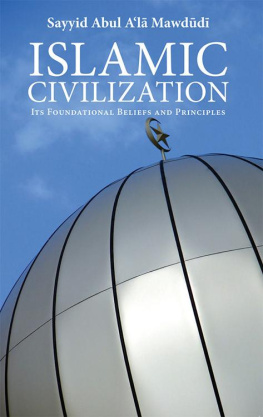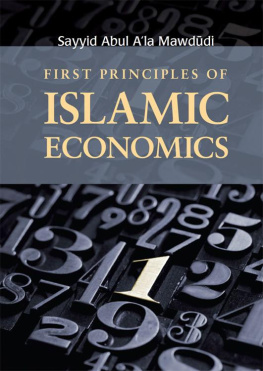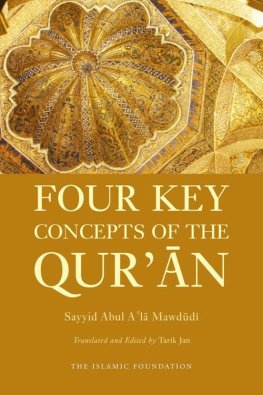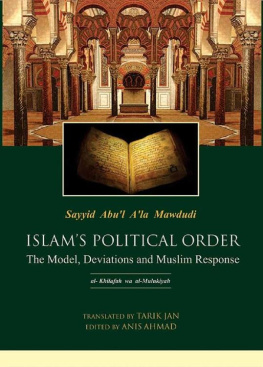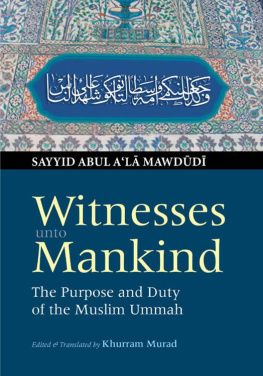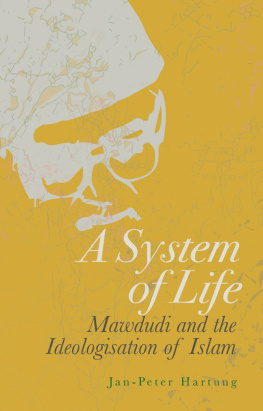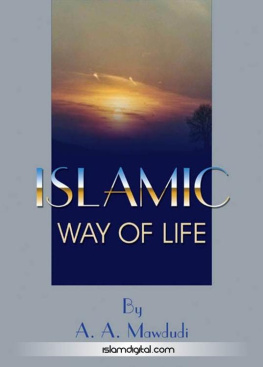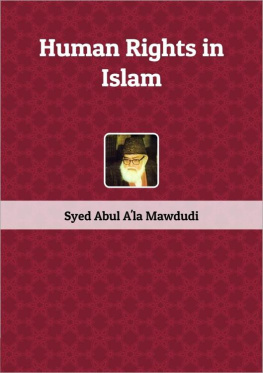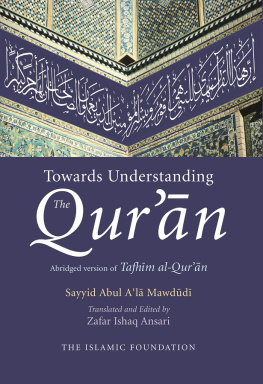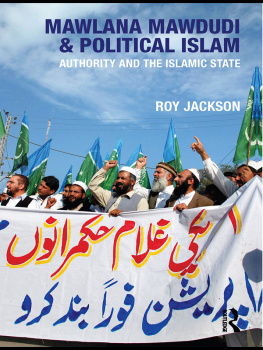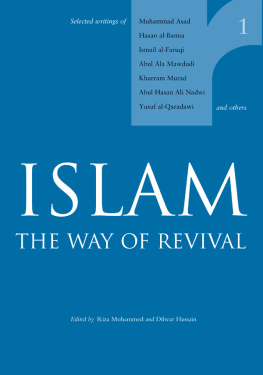Sayyid Abul Ala Mawdudi - Islamic Civilization
Here you can read online Sayyid Abul Ala Mawdudi - Islamic Civilization full text of the book (entire story) in english for free. Download pdf and epub, get meaning, cover and reviews about this ebook. year: 2015, publisher: Kube Publishing Ltd, genre: Religion. Description of the work, (preface) as well as reviews are available. Best literature library LitArk.com created for fans of good reading and offers a wide selection of genres:
Romance novel
Science fiction
Adventure
Detective
Science
History
Home and family
Prose
Art
Politics
Computer
Non-fiction
Religion
Business
Children
Humor
Choose a favorite category and find really read worthwhile books. Enjoy immersion in the world of imagination, feel the emotions of the characters or learn something new for yourself, make an fascinating discovery.
- Book:Islamic Civilization
- Author:
- Publisher:Kube Publishing Ltd
- Genre:
- Year:2015
- Rating:5 / 5
- Favourites:Add to favourites
- Your mark:
- 100
- 1
- 2
- 3
- 4
- 5
Islamic Civilization: summary, description and annotation
We offer to read an annotation, description, summary or preface (depends on what the author of the book "Islamic Civilization" wrote himself). If you haven't found the necessary information about the book — write in the comments, we will try to find it.
Islamic Civilization — read online for free the complete book (whole text) full work
Below is the text of the book, divided by pages. System saving the place of the last page read, allows you to conveniently read the book "Islamic Civilization" online for free, without having to search again every time where you left off. Put a bookmark, and you can go to the page where you finished reading at any time.
Font size:
Interval:
Bookmark:
ISLAMIC
CIVILIZATION
The Essential Mawdudi Series
First Principles of Islamic Economics
Four Key Concepts of the Qurn
Islamic Civilization
Let Us Be Muslims
The Islamic Movement
Towards Understanding Islam
Towards Understanding the Quran, Vols 1-9, 14
Towards Understanding the Quran (single abridged volume)
Forthcoming
Towards Understanding the Quran, Vols 10-13
Worship in Islam
ISLAMIC
CIVILIZATION
ITS FOUNDATIONAL BELIEFS AND PRINCIPLES
Sayyid Abul Al Mawdd
Translated by
Syed Akif
THE ISLAMIC FOUNDATION
Islamic Civilization: Its Foundational Beliefs and Principles
Published by
THE ISLAMIC FOUNDATION,
Markfield Conference Centre,
Ratby Lane, Markfield, Leicestershire
LE67 9SY, United Kingdom
E-mail:
Website: www.islamic-foundation.com
Quran House, PO Box 30611, Nairobi, Kenya
PMB 3193, Kano, Nigeria
Distributed by
KUBE PUBLISHING LTD.
Tel: +44(0)1530 249230, Fax: +44(0)1530 249656
E-mail:
Copyright The Islamic Foundation 2013/1434 AH
All rights reserved. No part of this publication may be reproduced, stored in a retrieval system, or transmitted in any form or by any means, electronic, mechanical, photocopying, recording or otherwise, without the prior permission of the copyright owner.
Cataloguing-in-Publication Data is available from the British Library
eISBN: 9780860376958
Typeset by: N.A.Qaddoura
Cover design by: Nasir Cadir
Contents
Sayyid Abul Al Mawdd (1903-79) is undoubtedly one of the greatest Islamic scholars produced by Muslim South Asia throughout its 1200 year-long history. With the launch of the Jamat-i-Islm in 1941, he not only joined the ranks of leading Muslim reformers, but became the torch bearer of a new Muslim political awareness being born out of the demise of Western colonialism and imperialism. He was one of the progenitors of the people called by the rather new term public intellectuals the rare breed of people who not only sit behind their desks or search the deep recesses of libraries to produce new epistemological views and scholarship but also have the vigour and the vision to combine social and political activism with their intellectualism persons who, to borrow a modern management phrase, walk the talk. Coming in the wake of the epochal work of South Asias all-time intellectual giant Muammad Iqbl and his reformation of classical Muslim thought, Sayyid Mawdd joined other modern Mus-lim public intellectuals, like Muammad Rashd Ri, to inspire three generations of twentieth-century Muslims on to the path of Muslim rethinking, reformation, and revolution.
Sayyid Mawdds political thoughts, chiefly the essential requirement of a vanguardist movement that was not just Islamic and revolutionary but one which also believed in the theo-intellectual basis of a state, which inspired reformist intellectuals like Sayyid Qub and numerous others throughout the Muslim world. Sayyid Mawdds influence on Muslim youth and intellectuals was very significant so significant that Pakistans military and political elite saw him as a threat strong enough to be locked up and even sentenced to death!
The present work Islm Tahdhb awr uske, Ul-o-Mabd is one of the few works of Sayyid Mawdd which has remained untranslated in a complete modern version, even though parts of the work have found their way to Western readers though other works of the author. I am grateful to two colleagues of my late father, Dr Zafar Ishaq Ansari and Professor Khurshid Ahmad, for reposing their confidence in me in giving me the chance to translate this work.
May God bless Sayyid Mawdd for his seminal works and the team that has made this translation possible, which will help to bring the work of this great scholar to a new audience. I seek your prayers for my own forgiveness (maghfirah) as well as for that of my family, my late parents and for all Muslims.
Makkah al-Mukarramah | Syed Akif |
Rab al-Awwal 1432
February 2011
Sayyid Abul Al Mawdd (1903-1979), one of the twentieth-centurys leading Muslim intellectuals and revivalists, wrote Islm Tahdhb awr Uske Ul-o Mabd, which was published in 1933. This book, written during the last period of colonial rule in British India and at a time when the momentum for independence was growing, attempts to bring out the vital relationship between a civilization and its underlying worldview and vision of life, with particular attention to the case of Islamic civilization.
Now civilization is one of the major ideas of the modern age. To stress its importance it would suffice to say that Arnold Toynbee, the towering historian of the twentieth century, regards it as the proper unit of historical inquiry.
A civilization understandably has a time and space dimension. Hence we speak of entities such as the Indus Valley civilization, the Babylonian civilization, the civilization of ancient Rome, or modern European civilization. Are civilizations, however, also related to the ideas and ideals cherished by those who live under their shadows?
In the present work Mawdd focuses his attention on the relationship between a civilization and its worldview, or the vision of life and the religious outlook that inspires and permeates it. His concern is to explore the relationship between Islam and civilization, and he sets out to examine how, in what ways, and to what extent Islam gives shape and direction to the civilization of Muslims. If Islams role in this regard is considered to be crucial, then how is Islam related to the temporal and spatial contexts of civilization itself?
Mawdudi notes with displeasure the trend among contemporary scholars of his day to regard Islamic civilization as an outgrowth and continuation of previous Middle Eastern and Greek and Roman civilizations. These scholars strove to prove that the constituent elements of Islamic civilization were derived from the civilizations that preceded it. As for the distinctive aspects of Islamic civilization, they tended to attribute them to the characteristics of the Arabs mindset which prompted them to make some adjustments while using the building blocks of other civilizations in erecting the edifice of their own civilization.
Mawdudi altogether denies the validity of this whole approach. He is at odds with the attitude of equating civilization with a nations cumulative knowledge, literature and fine arts, its literary and rhetorical devices, modes of social life, style of refined living and system of governance. He does not consider these to be the equivalent of civilization. In his view, they are the end results and manifestations rather than the essence of a civilization; they are not the root of a
There are good reasons why civilizations should be viewed in terms of the basic ideas and ideals underlying them. Yet while many changes have taken place over the millennia, humanity continues to be perennially confronted with the same basic questions: Is the existence of the universe and of humankind simply the result of a fortuitous combination of circumstances or does it represent the decision of an All-Wise and All-Powerful Creator? If the latter is the case, then what are His basic attributes and how is humanity expected to relate to Him? What is the position of the human being in the overall scheme of the universe and what is the purpose and mission of his life? Is the physical death of the human individual tantamount to his total extinction or does his life continue even after he has been subjected to biological death? Does God expect human beings to act in a particular manner to achieve self-fulfilment and abiding success and felicity? If so, has God provided any guidance to that effect and how can humanity find out what that guidance consists of?
Next pageFont size:
Interval:
Bookmark:
Similar books «Islamic Civilization»
Look at similar books to Islamic Civilization. We have selected literature similar in name and meaning in the hope of providing readers with more options to find new, interesting, not yet read works.
Discussion, reviews of the book Islamic Civilization and just readers' own opinions. Leave your comments, write what you think about the work, its meaning or the main characters. Specify what exactly you liked and what you didn't like, and why you think so.

